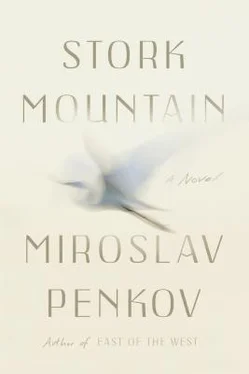Miroslav Penkov - Stork Mountain
Здесь есть возможность читать онлайн «Miroslav Penkov - Stork Mountain» весь текст электронной книги совершенно бесплатно (целиком полную версию без сокращений). В некоторых случаях можно слушать аудио, скачать через торрент в формате fb2 и присутствует краткое содержание. Год выпуска: 2016, Издательство: Farrar, Straus and Giroux, Жанр: Современная проза, на английском языке. Описание произведения, (предисловие) а так же отзывы посетителей доступны на портале библиотеки ЛибКат.
- Название:Stork Mountain
- Автор:
- Издательство:Farrar, Straus and Giroux
- Жанр:
- Год:2016
- ISBN:нет данных
- Рейтинг книги:4 / 5. Голосов: 1
-
Избранное:Добавить в избранное
- Отзывы:
-
Ваша оценка:
- 80
- 1
- 2
- 3
- 4
- 5
Stork Mountain: краткое содержание, описание и аннотация
Предлагаем к чтению аннотацию, описание, краткое содержание или предисловие (зависит от того, что написал сам автор книги «Stork Mountain»). Если вы не нашли необходимую информацию о книге — напишите в комментариях, мы постараемся отыскать её.
Stork Mountain — читать онлайн бесплатно полную книгу (весь текст) целиком
Ниже представлен текст книги, разбитый по страницам. Система сохранения места последней прочитанной страницы, позволяет с удобством читать онлайн бесплатно книгу «Stork Mountain», без необходимости каждый раз заново искать на чём Вы остановились. Поставьте закладку, и сможете в любой момент перейти на страницу, на которой закончили чтение.
Интервал:
Закладка:
And how come he left the keys in the ignition on his way to the tavern? Wasn’t he afraid the bus might get stolen? “And who would steal it? Dyado Dacho? I’m more afraid the key might fall out of my pocket. It’s happened twice before.”
Within a week he’d doubled the fee I was paying him to deliver my letters.
“Dyado Dacho’s been winning,” he said, though I knew their bets were symbolic. “And who are you writing to so much anyway? Have you got yourself a damsel?”
“The CIA,” I told him. He snickered.
“So your mommy and daddy are secret agents, then?”
“I think he reads my letters,” I told Elif that day, and sat on the curb a few feet from her bench. But as always she said nothing. Day in, day out, that’s what we did — for fifteen minutes she would sit on the bench on the square and I on the curb in silence. I faced one way, she faced another, and yet it didn’t matter that we kept quiet. At last she stood up and headed home, and some time after, I followed in her steps and took my seat in the café, next to Grandpa, who rolled dice after dice.
“You be careful with Elif,” he told me on more than one occasion. “People are starting to talk.”
I feigned surprise. It was the letters I needed to send. My parents were worried.
“As am I. You stay away from that girl.”
But I couldn’t. These fifteen minutes of mutual silence were all I looked forward to, awake or in my sleep. And people would always talk. The feast of Saint Constantine was coming near, they said, less than two weeks away. And once again the little girls had started burning with the fever. The imam had locked up his girl in her room. It’s a bad year , someone said in the café . It’s May already, but it’s cold and humid like October. The grass is rotting. And my chickens aren’t laying eggs.
“What do the chickens have to do with things?” Grandpa asked me later, but I could tell that the closer we got to May 21, the more restless he grew.
It was a week before the feast when Grandpa took me to the river. It had rained all night and a thick mist rolled over the ground. The road was muddy, and so were the banks and the river. Up above us a few storks flew in the cloudy sky, but most of them watched us passing up from their nests in the oak tops. Every now and then a male stork would balance himself atop a female, rub his long neck against hers, clatter his bill, and flap his wings. For a week, I had watched them mate from the terrace, and I watched them now, walking the muddy bank.
“Where are we going?” I asked, but Grandpa wouldn’t tell me.
“Must you always ask so many questions?” he said, then urged me to walk faster; we didn’t have all day.
We reached the giant walnut of the nestinari just when the sun was peeking from behind a break in the clouds. The nests in the branches were heavy with mating storks. But these storks were smaller than the others in the village. And they were black.
This was their tree. The only place in all of Klisura where black storks gathered. We watched them for some time — the males climbing the females, some flying away, others returning to their nest, a snake, a frog, a rodent in their bill. My eyes drifted to the nest where Elif and I had sat, where now two storks rubbed their long necks together.
“I try to come here every now and then,” Grandpa said, and tightened up his coat. “Especially once their babies hatch.”
A gust blew through the meadow and I too zipped up my jacket. Such cool weather, Grandpa told me later, was odd, uncharacteristic. The cold was bad for the storks, bad for their babies and for their food. But secretly I cherished the cold — like garlic does a vampire, it kept the mosquitoes at bay.
“What’s wrong with you?” Grandpa asked me, and pinched the scruff of my neck. “Did all your sailboats sink or something?”
“I’m cold,” I lied. “Let’s get warm in the nestinari shack.” I started toward the little hut under the tree. But Grandpa wouldn’t follow.
“I’d rather let the frost bite off my balls,” he said, “than set a foot inside their shack. The crazy fools.” And then he clapped his hands so as to spook the mating storks.
SEVEN
THUNDER ROLLED across the hills of Turkey. Out the open window I watched the shapes of black trees sway in the yard. The house was quiet. The wind smelled of rain.
How weary I had been, a few weeks back, walking out of the airplane in Sofia; disconnected from the world, fed up with my life as a failed graduate student. And how distant this weariness felt now. The rain nourished me, my feet burned, my fingers itched, and I could almost hear the roots sprouting out of them and spreading through the soil. Grandpa and Elif, her father, even the ruined houses of Klisura, were nothing but bricks in my foundation. And yet the bottom line revealed a terrifying truth — this trip, like so many of my other endeavors, had proved a failure: I was still broke and still in debt.
The Tower of Klisura stood tall over the quiet village. A pair of storks had started constructing their nest atop the metal frame and I imagined them now in the dark, huddled against the wind. How much would we make, I wondered, if we turned that section of Klisura into a wind farm? How much would the Turkish company pay us for a few empty lots?
After two decades away Captain Kosta had returned to the Strandja to fight for her and bring her freedom. After fortysome years away, Grandpa too had chosen to come back. Now he too was waging war for liberation — that of Klisura and probably his own. How could I ask him then to sell what he was fighting so desperately to preserve?
My thoughts turned like concrete in a mixer: ancient skulls mixed with stork eggs, with muddy rivers, with fire dancers and janissaries slaying Christian bandits and dragging them by their ankles through the dirt. Captain Kosta watched me, atop his cask of gunpowder, his face black with the smoke of battle, his face the face of Grandpa. The imam sang somewhere in the village, or maybe I only thought I heard him singing. My great-grandfather picked my teeth and ate them, one by one, as if they were sweet grapes. “Whatever you think of doing,” his raspy voice echoed, “I’ve already done it. And it was nothing special. Now bring the papers so I can sign. The land is yours.”
And through these visions, like a knife smoothly sliding through a block of cheese, Elif’s headscarf was falling down, down, down. A flash of lightning revealed before me the walnut tree. A black wing slashed it like an ax and where the tree had stood I saw a dark shape grow thicker, darker. I heard the growling of wolf-killing dogs and with the growling an ugly thought rang in my ears: That which will be demolished must first be built. That which will be taken must be given first. The giant walnut swayed, Elif’s closed lids flicked open, and raindrops glistened on her neck. “Merciful Saint Elena,” I heard her tell me, “has come to our yard.” It was raining. Soft rain, which turned to hail. The hail slammed against our roof, against the side of our house, against my window, and into my room.
“ Amerikanche .” I heard Elif call me and only then did I realize I was no longer in a dream. The hail was no hail, but pebbles she chucked from the road. And there in the road, I recognized the sharp hump of the Lada, its high beams flickering, the engine roaring. “Come on, my American friend,” Elif called, and stepped on the gas. “Let’s go before I’ve woken the dead.”
EIGHT
WHEN I WAS STILL A LITTLE BOY, Grandpa often told me stories of khans and tsars, of great heroes. Sometime in the tenth century, a scribe recorded the lineage of the first Bulgarian rulers in a codex, which lay forgotten between the pages of a Slavonic Bible until a Russian historian stumbled upon it a thousand years later. This codex, now famous as the Nominalia of the Bulgarian Khans, began with Attila, also known as Avitohol, then spoke of his son Irnik, of Gostun, Kubrat, and of his son Asparuh, the white horseman, who with his tribes crossed the Danube, allied with the Slavs, defeated the Byzantine Empire, and founded Bulgaria in 681 A.D.
Читать дальшеИнтервал:
Закладка:
Похожие книги на «Stork Mountain»
Представляем Вашему вниманию похожие книги на «Stork Mountain» списком для выбора. Мы отобрали схожую по названию и смыслу литературу в надежде предоставить читателям больше вариантов отыскать новые, интересные, ещё непрочитанные произведения.
Обсуждение, отзывы о книге «Stork Mountain» и просто собственные мнения читателей. Оставьте ваши комментарии, напишите, что Вы думаете о произведении, его смысле или главных героях. Укажите что конкретно понравилось, а что нет, и почему Вы так считаете.











